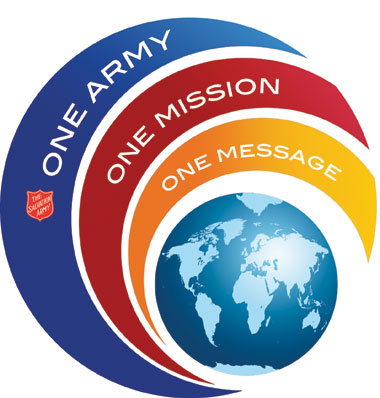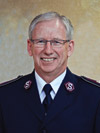 Happy New Year! My wife, Rosalie, joins me in greeting you and we assure you of our prayers. We believe that God will bless and use The Salvation Army, and each of you, throughout 2012.
Happy New Year! My wife, Rosalie, joins me in greeting you and we assure you of our prayers. We believe that God will bless and use The Salvation Army, and each of you, throughout 2012.
As we enter this new year, I am reflecting on the many expressions of hope found in our territory. From my vantage point, General Linda Bond's vision plan of One Army, One Mission, One Message (see Salvationist.ca/international-vision) outlines the aspirations that I covet for our Army. As General Bond writes, “I see a Spirit-filled Army of the 21st century, convinced of its calling, moving forward together, into the world of the hurting, broken, lonely, disposed and lost, reaching them by all means, with the transforming message of Jesus bringing freedom, hope and life.”
In November 2011, the executive leaders in our territory (Cabinet secretaries and divisional leaders) met at Jackson's Point, Ont., and used the General's vision plan to strategize for the future. Though I write with deep personal conviction, my colleagues join me in sharing these thoughts.
One Army
We wish to affirm:
• a clear calling to a sacramental life for every Salvationist marked by sacrificial and selfless service and lived out in the framework of holiness. We remain committed to the non-practice of the sacraments of communion and baptism as a denomination and as a part of the international Salvation Army. This is not meant to put us at odds with other Christian traditions, but we testify freely to a full salvation expressed in a supreme love for God and sacrificial love for others
• a leadership conviction with regard to our witness through uniform wearing and our desire to increase our public visibility with our officer contingent leading the way
• the significant value of active officers, retired officers and local officers in meeting the leadership needs throughout The Salvation Army
• our desire that The Salvation Army in Canada and Bermuda would be a covenanted Army and that each of us would have the opportunity to explore covenant as we share faith and service together
• our partnership with the international Salvation Army as we give and support financially and facilitate the availability of human resources to help lead the Army around the world.
One Mission
We want to:
• emphasize the importance and significance of discipleship and evangelism. We need soldiers who will carry out God's mission and win the world for him as a result of training and equipping
• ensure that in these days of spiritual drift in our culture, every Salvation Army ministry unit would have our spiritual footprint and would bring about Kingdom outcomes
• give thanks for excellent financial management that enables us to invest in new mission opportunities focused on outcome-based ministry
• reclaim and strengthen our ministry to the whole family, making children and youth a priority
• declare our desire for growth in every expression of our ministry and mission
• explore the principle that above all else “mission matters most,” praying that God will enable us to give evidence that this is so.
One Message
Introducing people to Jesus, securing their place in eternity and discipling them for service remains central to all we are and do. Our key message is that Jesus Christ is the hope for the world (see John 3:16; Luke 19:10). We are committed to sharing this message by:
• reaching children and youth
• advocating on behalf of those we serve
• serving from a position of strength and declaring, “God is doing a new thing”
• keeping our mission central to everything we do and managing the distractions
• calling people to salvation and covenant through the experience of soldiership
• asking every Salvationist to consider their part in being a transforming influence in their community.
As the territorial commander, I want to lead an Army that celebrates its relationship with God and others. As we do this, we will remain fit for purpose in the world in which we live and serve. We have the potential to be a mighty expression of God's love and faithfulness. Please join me in this time of focusing the vision as we become one Army with one mission sharing one message.
 Commissioner Brian Peddle is the territorial commander of the Canada and Bermuda Territory.
Commissioner Brian Peddle is the territorial commander of the Canada and Bermuda Territory.









One corps I was told was here held meetings in evenings at their local coffee house. However I could never get a response to what time it started. I did get the chance to volunteer on their ESS responce teams but was told no uniform. In one chance I got to help in a disaster donation center. Great wasnt even lead by a Christian. again no one not even the officer wore a uniform. Infact sadly I thought the officer was a victim not the officer.
Then I discovered another Corps small in numbers one I attended earlier. So went there. I was able to fill the seat I could greet. but was not able to do much else not even work the sound. Apperently thats was the youths job. However the youth had no guidance the sound was terrible and it was very hard to sit there knowing how to fix it. But I felt maybe if I spend enough time filling the pew the pastor will reconize my gifts. During this time at work a co-workers mother was loosing the battle to cancer and placed into hospice home. Considering all I was doing I decided to work so the family could take one day a week and spend time with each other and to donate the proceeds to them so they could afford to eat. However after the mother had passed I went basck to the church. After the service the Pastor wanted to speak with me. By the time I left that meeting short of being stripped of soldiership (it was offered to me to think of my life and consider surrendering my uniform) I was made to feel my actions were not of God and that my soul was endangered of being sent to hell. I was to sit in the church and contribute to the offering nothing more nothing less. I will never enter that corp again. I took a few weeks of personal time then went into another corps.
I walked into that corps not in uniform. I was not welcomed. I had to seek out a bulletin on my own. However when the officer did realize I was a soldier they started to slowly welcome me. I was to sit in the corps and unless asked I was not used. I could not run sound, I could not greet. The only time I had opportunities to serve was if their was a conference at the corps for women then was asked to support that by doing kitchen dutie. And when the Corps were doing something for the families I could help with set up and take down. And if they were doing something for......... Finally I asked whenare they going to do something for the single male? and apperently single people dont build the church, they serve the church. It was at that time I started praying where do I stand Lord. I have great gifts but I cant use them Lord please show me what I am suppose to do. At that time again a small inconvience struck our company and that meant the driver that wanted to work on sundays left almost forcing me to work sundays.
You know for the next several months my time with god was in the drivers seat of my van at work. I was my pastor, my greater, my sound tech, my praise and worship leader. Even though I had the best church I missed the church. I wanted fellowship, I wanted opportunities to serve, I wanted, I wanted I longed for.
One week we got a new driver this guy wanted to work on Sundays. Especailly mornings. Thank Jesus and Praise God I can go to church again. But Where? So I got up thinkig I will go the Presbyterian Church. But as the time came for me to leave the restaurant I felt a sense to drive up the hill in the opposite direction and head to a grocery store. I went right past the store was off in thought. When I realized my error I looked for a good turn around spot and there it was. A Church it had three little flames on the sign guess the colors. I looked at the service time then my watch and thought what the hey the other church will have to wait.
I found a parking spot in the back corner of the parking lot, and walked in. Bam I was met by the warmest grandma smile, she had my hand and truly welcomed me. She asked if I had a familly and I told her no what you see is what you get. She was like well thats ok Jesus loves you. I hadnt been eccepted like that in a very long time. And every Sunday I get the same welcome like I am aprt of that family. I have constant fellowship with various memebers of the church. Being a student I have often had some one give me a bucket of soup here and there. At fellowship meals some one is alway bringing me a plate of goodies or meals to have being a student and all it has to be hard. My gifts are being used. Infact to write this means I have had to put down my pen from writing a community service program that our church is looking to impliment to truly reach the needs of the community. I run the sound, I greet people, I will be running the community service branch of the church. And am going to be interning for possible ordination.
Again the Army needs to make a drastic jump back to where it should be doing what it was raised up to do and be. Commissioner Peddle I encourage you to bring the Army in Canada back on track. All it really does in some cases is a command that the army was so faithful in doing hence the term Territorial Commander. Officers need to remember first and foremost they lead a church not a socail service center. They need to be accepting of all regardless if they come with wife and child. Get back to wearing the uniform, get back to preaching and practising holiness, Get back to making people squirm in their seats. get back to the knee drills, to praying over people who seek help.
My prayer for the Salvation Army is that they once again be the leaders of Revival, the proclaimers of the Gospel, That they once again are known for their Lord and not their food hamper.